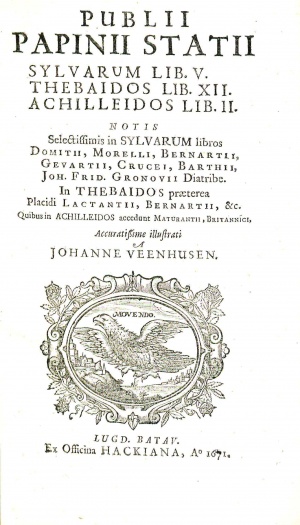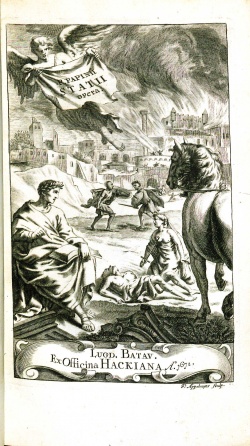Difference between revisions of "Publii Papinii Statii Sylvarum"
| Line 2: | Line 2: | ||
===by P. Papinius Statius=== | ===by P. Papinius Statius=== | ||
__NOTOC__ | __NOTOC__ | ||
| − | |||
| − | |||
| − | |||
| − | |||
| − | |||
| − | |||
{{BookPageInfoBox | {{BookPageInfoBox | ||
|imagename=StatiusPubliiPapinii1671.jpg | |imagename=StatiusPubliiPapinii1671.jpg | ||
| Line 18: | Line 12: | ||
|year=1671 | |year=1671 | ||
|set=1 | |set=1 | ||
| − | }} | + | }}[[File:PubliiPapiniiStatiiSylvarum1671HalfTitle.jpeg|left|thumb|250px|<center>Half-title.</center>]][http://en.wikipedia.org/wiki/Publius_Papinius_Statius Publius Papinius Statius] was a Roman poet born in Naples who lived from c. 45 to c. 96CE.<ref>[http://www.oxfordreference.com/view/10.1093/acref/9780199548545.001.0001/acref-9780199548545-e-2802 "Stā'tius”] in ''The Oxford Companion to Classical Literature'', ed. by M.C. Howatson (Oxford: Oxford University Press, 2011).</ref> His father was a poet before him as well as a schoolmaster and teacher of literature. Statius was held in high regard by the Roman populous who attended his poetry readings in vast numbers.<ref>Ibid.</ref> Working with one of the emperor Domitian’s favorite poets, Statius had generous exposure in the city, even winning Domitian’s poetry competition at the Alban Games, though losing at the more prestigious Capitoline Games later that year.<ref>[http://www.oxfordreference.com/view/10.1093/acref/9780192801463.001.0001/acref-9780192801463-e-2088 "Statius, Publius Papinius"] in ''Oxford Dictionary of the Classical World'', ed. by John Roberts (Oxford: Oxford University Press, 2007).</ref> He married Claudia, another poet’s widow, and had no children of his own, though Claudia had one daughter. Her love for him was immortalized in a poem Statius wrote to persuade her to leave Rome and nurse him during illness in Naples.<ref>Ibid.</ref> In truth, Statius retired to Naples after his devastatingly disappointing loss at the Capitoline Games, c. 90 CE.<ref>"Stā'tius” in ''The Oxford Companion to Classical Literature''.</ref><br/> |
| + | <br/> | ||
| + | Statius’s ''Thebaid'', published c. 91 CE, is the only Roman epic certainly published as a complete work by its author.<ref>"Statius, Publius Papinius" in ''Oxford Dictionary of the Classical World''.</ref> It contains twelve books and took the poet twelve years to complete.<ref>"Stā'tius” in ''The Oxford Companion to Classical Literature''.</ref> In his account of the war between Oedipus’ sons over Thebes, Statius critically examined his own style and writing, and drew on many other works to inspire his framework and problematically deep themes of civil war, absolutism, human violence and madness, succession, authority, and familial discord.<ref>"Statius, Publius Papinius" in ''Oxford Dictionary of the Classical World''.</ref><br/> | ||
| + | <br/> | ||
| + | The ''Silvae'' was a collection of five books, the first four published between 91 and 95CE, and the fifth most likely published after Statius’ death in 96CE.<ref>"Stā'tius” in ''The Oxford Companion to Classical Literature''.</ref> The collection contains thirty-two poems, twenty-six of them in the standard post-classical Greek meter of hexameter.<ref>"Statius, Publius Papinius" in ''Oxford Dictionary of the Classical World''.</ref> Statius wrote these poems for his patrons, including Domitian, to immortalize specific events in their lives as well as his own. As a simpler and more spontaneous, less polished work than the ''Thebaid'', the ''Silvae'' has greater appeal to many casual readers, though the former epic is attractive for its depth and exploration.<ref>Ibid.</ref><br/> | ||
| + | <br/> | ||
| + | The ''Achilleid'' is the last book of poems by Statius, written after his retirement to Naples, but unfinished due to his death.<ref>"Stā'tius” in ''The Oxford Companion to Classical Literature''.</ref> It was meant to tell the story of Achilles, though the completion of only the first book and part of the second means that all that is written is Thetis’ anxiety for her son’s future through Achilles’ departure for Troy.<ref>Ibid.</ref> | ||
==Evidence for Inclusion in Wythe's Library== | ==Evidence for Inclusion in Wythe's Library== | ||
| + | Listed in the [[Jefferson Inventory]] of [[Wythe's Library]] as "Statius. varior. 8vo." This was one of the books kept by [[Thomas Jefferson]]. He later sold a copy to the Library of Congress in 1815, but it no longer exists to verify the edition or Wythe's prior ownership.<ref>E. Millicent Sowerby, ''Catalogue of the Library of Thomas Jefferson'' 2nd ed. (Charlottesville: University Press of Virginia, 1983), 4:428 (no.4299).</ref> Both the [https://digitalarchive.wm.edu/handle/10288/13433 Brown Bibliography]<ref> Bennie Brown, "The Library of George Wythe of Williamsburg and Richmond," (unpublished manuscript, May, 2012) Microsoft Word file. Earlier edition available at: https://digitalarchive.wm.edu/handle/10288/13433</ref> and [http://www.librarything.com/profile/GeorgeWythe George Wythe's Library]<ref>''LibraryThing'', s. v. [http://www.librarything.com/profile/GeorgeWythe "Member: George Wythe"], accessed February 28, 2014.</ref> on LibraryThing include the 1671 Leiden edition based on E. Millicent Sowerby's inclusion of that edition in ''Catalogue of the Library of Thomas Jefferson''. The Wolf Law Library purchased a copy of the same edition. | ||
==Description of the Wolf Law Library's copy== | ==Description of the Wolf Law Library's copy== | ||
| − | Octavo, bound in burgundy goatskin with attractive gilt-outlined paneling floral cornerpieces on the boards. Has gilt decoration on edges with matching inner gilt rolls and five raised bands on spine with gilt decorations on the bands. All edges gilt over marbling. Contains marbled endpapers with pencil annotations and ownership inscription of Edmund Lamb on the first blank. Purchased from Collectable Books | + | Octavo, bound in burgundy goatskin with attractive gilt-outlined paneling floral cornerpieces on the boards. Has gilt decoration on edges with matching inner gilt rolls and five raised bands on spine with gilt decorations on the bands. All edges gilt over marbling. Contains marbled endpapers with pencil annotations and ownership inscription of Edmund Lamb on the first blank. Purchased from Collectable Books. |
| − | View this book in [https://catalog.swem.wm.edu/law/Record/3621160 William & Mary's online catalog] | + | View this book in [https://catalog.swem.wm.edu/law/Record/3621160 William & Mary's online catalog.] |
| + | |||
| + | ==References== | ||
| + | <references/> | ||
==External Links== | ==External Links== | ||
| − | [http://books.google.com/books?id=yENBAAAAMAAJ&printsec=frontcover | + | Read this book in [http://books.google.com/books?id=yENBAAAAMAAJ&printsec=frontcover Google Books.] |
| − | |||
| − | |||
| − | |||
| − | |||
[[Category:George Wythe Collection at William & Mary's Wolf Law Library]] | [[Category:George Wythe Collection at William & Mary's Wolf Law Library]] | ||
[[Category:Latin Literature]] | [[Category:Latin Literature]] | ||
[[Category:Titles in Wythe's Library]] | [[Category:Titles in Wythe's Library]] | ||
Revision as of 17:51, 28 February 2014
by P. Papinius Statius
| Publii Papinii Statii Sylvarum lib. V. ; Thebaidos lib. XII. ; Achilleidos lib. II | |
|
Title page from Publii Papinii Statii Sylvarum lib. V. ; Thebaidos lib. XII. ; Achilleidos lib. II, George Wythe Collection, Wolf Law Library, College of William & Mary. | |
| Author | P. Papinius Statius |
| Published | Lugd. Batav.: Ex officina Hackiana, Ao |
| Date | 1671 |
| Language | Latin |
| Volumes | 1 volume set |
Statius’s Thebaid, published c. 91 CE, is the only Roman epic certainly published as a complete work by its author.[6] It contains twelve books and took the poet twelve years to complete.[7] In his account of the war between Oedipus’ sons over Thebes, Statius critically examined his own style and writing, and drew on many other works to inspire his framework and problematically deep themes of civil war, absolutism, human violence and madness, succession, authority, and familial discord.[8]
The Silvae was a collection of five books, the first four published between 91 and 95CE, and the fifth most likely published after Statius’ death in 96CE.[9] The collection contains thirty-two poems, twenty-six of them in the standard post-classical Greek meter of hexameter.[10] Statius wrote these poems for his patrons, including Domitian, to immortalize specific events in their lives as well as his own. As a simpler and more spontaneous, less polished work than the Thebaid, the Silvae has greater appeal to many casual readers, though the former epic is attractive for its depth and exploration.[11]
The Achilleid is the last book of poems by Statius, written after his retirement to Naples, but unfinished due to his death.[12] It was meant to tell the story of Achilles, though the completion of only the first book and part of the second means that all that is written is Thetis’ anxiety for her son’s future through Achilles’ departure for Troy.[13]
Evidence for Inclusion in Wythe's Library
Listed in the Jefferson Inventory of Wythe's Library as "Statius. varior. 8vo." This was one of the books kept by Thomas Jefferson. He later sold a copy to the Library of Congress in 1815, but it no longer exists to verify the edition or Wythe's prior ownership.[14] Both the Brown Bibliography[15] and George Wythe's Library[16] on LibraryThing include the 1671 Leiden edition based on E. Millicent Sowerby's inclusion of that edition in Catalogue of the Library of Thomas Jefferson. The Wolf Law Library purchased a copy of the same edition.
Description of the Wolf Law Library's copy
Octavo, bound in burgundy goatskin with attractive gilt-outlined paneling floral cornerpieces on the boards. Has gilt decoration on edges with matching inner gilt rolls and five raised bands on spine with gilt decorations on the bands. All edges gilt over marbling. Contains marbled endpapers with pencil annotations and ownership inscription of Edmund Lamb on the first blank. Purchased from Collectable Books.
View this book in William & Mary's online catalog.
References
- ↑ "Stā'tius” in The Oxford Companion to Classical Literature, ed. by M.C. Howatson (Oxford: Oxford University Press, 2011).
- ↑ Ibid.
- ↑ "Statius, Publius Papinius" in Oxford Dictionary of the Classical World, ed. by John Roberts (Oxford: Oxford University Press, 2007).
- ↑ Ibid.
- ↑ "Stā'tius” in The Oxford Companion to Classical Literature.
- ↑ "Statius, Publius Papinius" in Oxford Dictionary of the Classical World.
- ↑ "Stā'tius” in The Oxford Companion to Classical Literature.
- ↑ "Statius, Publius Papinius" in Oxford Dictionary of the Classical World.
- ↑ "Stā'tius” in The Oxford Companion to Classical Literature.
- ↑ "Statius, Publius Papinius" in Oxford Dictionary of the Classical World.
- ↑ Ibid.
- ↑ "Stā'tius” in The Oxford Companion to Classical Literature.
- ↑ Ibid.
- ↑ E. Millicent Sowerby, Catalogue of the Library of Thomas Jefferson 2nd ed. (Charlottesville: University Press of Virginia, 1983), 4:428 (no.4299).
- ↑ Bennie Brown, "The Library of George Wythe of Williamsburg and Richmond," (unpublished manuscript, May, 2012) Microsoft Word file. Earlier edition available at: https://digitalarchive.wm.edu/handle/10288/13433
- ↑ LibraryThing, s. v. "Member: George Wythe", accessed February 28, 2014.
External Links
Read this book in Google Books.

